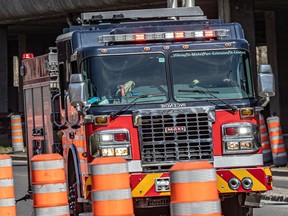It takes about 15 seconds longer on average for firefighters to arrive at the scene of a fire because of road congestion, statistics show.

Montrealers seem to agree traffic congestion is causing them to spend more time travelling by car anywhere in the city.
And now, it seems, congestion is costing precious seconds for firefighters to arrive at the scenes of emergencies.
According to statistics provided by the Montreal fire department, it takes about 15 seconds longer on average for firefighters to arrive at the scene of a fire. In 2018, it took an average of four minutes and 59 seconds to arrive. In 2023, it took an average of five minutes and 14 seconds for firefighters to respond.
The number has dipped slightly this year to five minutes and 13 seconds for the period of Jan. 1 to July 16, according to the figures provided.
Firefighters also act as first responders for medical emergencies in order to provide important life-saving care before an ambulance arrives. They generally take about 10 seconds less to arrive at their calls, according to the statistics, because they have less equipment to bring for medical calls.
Guy Lapointe, a division chief for the city’s fire department, said road congestion is the main cause for the longer delays.
“It’s really the time on the road that has increased over the years,” Lapointe said. “The biggest reason for this is the sheer density of traffic congestion.”
Lapointe said the fire department is working on implementing a more efficient system to transmit emergency calls to fire stations.
“We have a new system for alerts in the fire stations,” Lapointe said. “We are confident this will help us save precious seconds.”
However, he pointed out the response time for firefighters is still well within the norms set by the ministry of public security, which determined firefighters should arrive faster than six minutes and 24 seconds after a call.
“We’re not concerned, but we’re always proactive to try to reduce response times,” Lapointe said.
Montrealers didn’t have a hard time believing congestion is costing the fire department time on the road. All those approached by a reporter agreed traffic has been getting worse in the last few years.
“There is too much construction right now,” said Georg Tjornhom, a construction worker who has lived in Montreal for 25 years since moving from Brooklyn. “A detour leads you right back to the same detour, so you’re driving in circles. I’m wasting a lot of time in traffic.”
Verdun resident Susan McCann said she feels the city is at least partly to blame for adding too many bicycle paths without proper consultation or planning how car traffic will be affected.
She said in her neighbourhood, the borough is removing car lanes on an already busy street in order to add bike lanes, and she fears it will cause even more congestion.
“It’s mayhem for people who have to use their cars to go places,” McCann said. “There is a whole set of society who have mobility issues. They need to use their cars. I personally feel there is going to be a backlash against the unqualified use of bike lanes without listening to the people who are directly affected.”
An ex-Montrealer visiting from Australia said traffic is about as bad as she remembered, but she noted Montrealers love to complain about being stuck in traffic.
“Maybe it’s a bit worse, but Montrealers definitely complain more,” said Anaïs Castillo Kent, who returned to visit the city in recent weeks after moving to Sydney, Australia, eight years ago. “Traffic is probably a bit worse in Sydney, but we don’t really complain about it. We live by the ocean, so everyone’s happy there.”